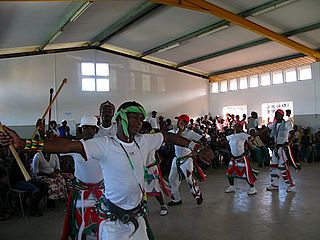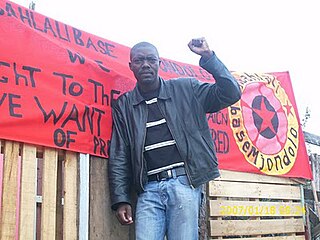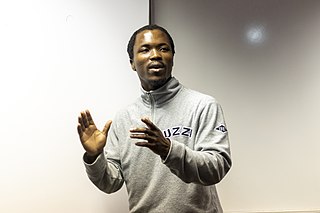Cato Manor is a working-class area located 7 kilometres (4.3 mi) from the city centre of Durban, South Africa.

Abahlali baseMjondolo is a socialist shack dwellers' movement in South Africa which primarily campaigns for land, housing and dignity, to democratise society from below and against xenophobia.

Sibusiso Innocent Zikode is the current president of the South African shack dwellers' movement, which he co-founded with others in 2005. Abahlali baseMjondolo claims to have an audited paid up membership of over 80 000 across South Africa. His politics have been described as 'anti-capitalist'. According to the Mail & Guardian "Under his stewardship, ABM has made steady gains for housing rights."

Kennedy Road is an informal settlement in Durban (eThekwini), in the province of KwaZulu-Natal in South Africa. Formed in the late 1970s or early 1980s, the settlement was mentioned by the African National Congress (ANC) after the end of apartheid but amenities were not improved. The site is mostly not connected to sanitation or electricity. Dissatisfaction with local councillors led to 2005 protests including a road blockade, out of which the shack dwellers movemment Abahlali baseMjondolo (AbM) formed. In 2009, an AbM meeting was attacked resulting in two deaths and a court case. More recently, the municipality has improved facilities and promised to relocate inhabitants.

Rajeev "Raj" Patel is a British Indian academic, journalist, activist and writer who has lived and worked in Zimbabwe, South Africa, and the United States for extended periods. He has been referred to as "the rock star of social justice writing."

The Western Cape Anti-Eviction Campaign was a non-racial popular movement made up of poor and oppressed communities in Cape Town, South Africa. It was formed in November 2000 with the aim of fighting evictions, water cut-offs and poor health services, obtaining free electricity, securing decent housing, and opposing police brutality.
UnFreedom Day is an unofficial annual event that is marked every year on or around 27 April. UnFreedom Day is planned to coincide with the official South African holiday called Freedom Day, an annual celebration of South Africa's first non-racial democratic elections of 1994.
eMacambini is a rural area in the KwaZulu-Natal province of South Africa which is mostly populated by members of the Macambini clan. It is near Mandeni on the Zululand coast, just north of Durban and close to the new King Shaka International Airport.

The Poor People's Alliance was network of radical grassroots movements in South Africa. It was formed in 2008 after the Action Alliance, formed in December 2006, was expanded to include two more organisations. It become defunct following the collapse of two of its affiliated movements, the Western Cape Anti-Eviction Campaign and the Landless People's Movement.
No Land! No House! No Vote! is the name of a campaign by a number of poor people's movements in South Africa that calls for the boycotting of the vote and a general rejection of party politics and vote banking. The name is meant to imply that if government does not deliver on issues important to affected communities these movements will not vote.

Mzonke Poni is an activist in Cape Town. He is the former chairperson of Abahlali baseMjondolo of the Western Cape and was previously a leader of the Western Cape Anti-Eviction Campaign. The Sunday Times has described him as "the face of an ANC nightmare - an angry activist mobilising the township masses to protest at what he calls the government's failure to create a better life for the poor."
South Africa has been dubbed "the protest capital of the world", with one of the highest rates of public protests in the world.
Rubin Phillip is bishop of the Anglican Diocese of Natal. The great-grandchild of indentured labourers from Andhra Pradesh, Phillip is the first of East Indian heritage in South Africa to hold the position of Bishop of Natal. He grew up in Clairwood, a suburb of Durban with a large concentration of people of Indian ethnicity, in a non-religious household, but converted to Christianity. He was a noted anti-apartheid activist and spent three years under house arrest in the 1970s and was banned in 1973. He was enthroned as bishop in February 2000.
The Constitution of South Africa protects all basic political freedoms. However, there have been many incidents of political repression, dating back to at least 2002, as well as threats of future repression in violation of this constitution leading some analysts, civil society organisations and popular movements to conclude that there is a new climate of political repression or a decline in political tolerance.
There have been a number of political assassinations in post-apartheid South Africa. In 2013 it was reported that there had been more than 450 political assassinations in the province of KwaZulu-Natal since the end of apartheid in 1994. In July 2013 the Daily Maverick reported that there had been "59 political murders in the last five years". In August 2016 it was reported that there had been at least twenty political assassinations in the run up to the local government elections on the 3rd of August that year, most of them in KwaZulu-Natal.
In March 2013 around a thousand people occupied a piece of land in Cato Crest, Durban and named it Marikana after the Marikana miners' strike. Mayor James Nxumalo blamed the occupation on migrants from the Eastern Cape. He was strongly criticised for this by the shack dwellers' movement Abahlali baseMjondolo who said that "The City Hall is red with blood".
Nqobile Nzuza was a resident in the Marikana Land Occupation in Cato Crest, which is part of Cato Manor in Durban, South Africa. She was a member of the shackdwellers' movement Abahlali baseMjondolo.

Ayanda Ngila (1992–2022), was a land activist, a prominent leader in the shack dweller's movement Abahlali baseMjondolo and deputy chairperson of its eKhenana Commune. He was assassinated on 8 March 2022.

The eKhenana Commune is a prominent land occupation in the historic working-class area of Cato Manor in Durban, South Africa. According to the Socio-Economic Rights Institute "The eKhenana settlement is organised as a cooperative in which residents collectively run a communal kitchen and tuck shop, theatre, poetry and music projects, and care for a subsistence vegetable garden named after the late Nkululeko Gwala [assassinated in 2013] as well as a poultry farm named in honour of the late S’fiso Ngcobo [assassinated in 2018]. The Commune has suffered sustained political repression, including multiple arrests and three assassinations in 2022.

Lindokuhle Mnguni was a land activist and a prominent leader in the shack dwellers' movement Abahlali baseMjondolo. He was chairperson of the movement's youth league as well as the chairperson of the eKhenana Commune. He was a leader of eKhenana's food sovereignty project which sought to make the commune more self-sustaining and independent. He was assassinated on 8 August 2022











